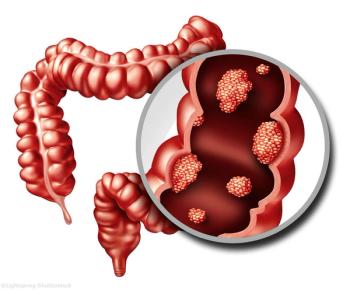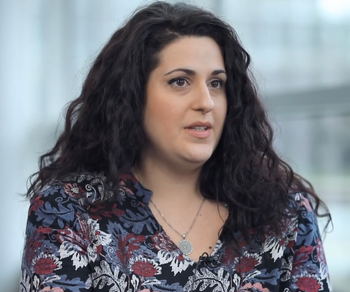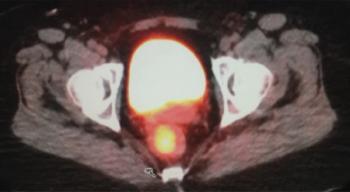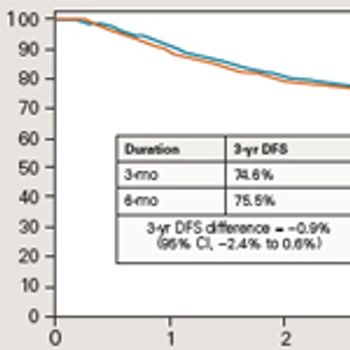
The survival advantages associated with NCCN guideline–driven care were not realized in younger patients with stage II and stage III rectal cancer.

Your AI-Trained Oncology Knowledge Connection!


The survival advantages associated with NCCN guideline–driven care were not realized in younger patients with stage II and stage III rectal cancer.

In an interview with Cancer Network, Lorraine Drapek describes a multidisciplinary program at MGH to support vaginal and sexual health post RT for GI and gynecologic malignancies.

Canadian Cancer Trials Group investigators say it's unclear if disease biology is different in younger patients or if older ones are more likely to undergo screening.

Early‐onset rectal cancer may differ biologically and in its response to multimodality therapy, according to a large retrospective study of NCCN data.

Combination therapy with a high-dose proton pump inhibitor and aspirin reduced the risk of progression to esophageal cancer in patients with Barrett esophagus.

MSKCC’s Dr. Nancy Kemeny discusses the impact of a company's decision to halt manufacture of a pump used to treat liver mets from colon and rectal cancers.

In this Q&A, we discuss the research into the relationships between gut microbiota, diet, and colorectal cancer.

Researchers from MD Anderson say their study results "open the field of immunoprevention in LS to checkpoint inhibitors as an immune interception strategy."

In this video, Pashalina Kehagias discusses how an early increase in ctDNA may predict a poor response to regorafenib in advanced CRC.

In this video, Dr. Douglas Fearon outlines ways that inhibiting CXCR4 may provoke an immune response to treat pancreatic and colorectal cancer.

Previous studies found calcium channel blockers could prevent pancreatic cancer, but have neglected to consider the effects of short-acting CCBs.

A highly selective small molecule A3AR agonist blocked development of oxaliplatin-induced neuropathic pain without interfering with anticancer effects.

A team of Finnish researchers has created a deep learning algorithm that appears to help clinicians better predict patient outcomes based on colorectal cancer tissue samples.

The STAT3 inhibitor napabucasin significantly improved survival among patients with colorectal cancer with elevated phosphorylated STAT3 expression.

In this interview we discuss preliminary results of the COMPASS trial, which used whole-genome sequencing and RNA sequencing to analyze the tumors of patients with advanced pancreatic ductal adenocarcinoma to identify possible first-line treatments.

As part of our coverage of the 2018 GI Cancers Symposium, we discussed the role of locoregional therapies for patients with metastatic esophageal and gastric cancers.

Adding bevacizumab maintenance therapy failed to improve outcomes compared with no treatment when administered during chemotherapy-free intervals to patients with metastatic colorectal cancer after induction chemotherapy.

Undergoing cytoreductive surgery plus hyperthermic intraperitoneal chemotherapy (HIPEC) resulted in improved overall survival compared with resection alone for patients with gastric cancer with peritoneal carcinomatosis, according to data presented at the 2018 Gastrointestinal Cancers Symposium.

A diet rich in foods known to cause inflammation may increase the risk for colorectal cancer by about one-third, according to the results of a newly published study.

A test measuring circulating tumor cells in the bloodstream was able to accurately detect early-stage colorectal cancers, according to the results of a new study.

A 56-year-old Caucasian woman presented to her primary care physician with a 3-month history of intermittent bright red rectal blood with defecation. At her initial visit, a digital rectal examination, anoscopy, and a pelvic examination with DNA testing for high-risk HPV were performed; all results were negative. She was referred for a colonoscopy, which revealed an abnormal area with a 3 × 4–cm mass in the rectum at a distance of 10 cm from the anal verge.

Patients with metastatic colorectal cancer and high expression of VEGF-D garner more benefit from the VEGFR-2 antibody ramucirumab than those with low VEGF-D expression, according to a new study.

A large meta-analysis found that current and former smoking status was associated with poorer colorectal cancer prognosis compared with never smoking, and that smoking cessation may improve survival over those who continue to smoke.

A previously healthy 36-year-old man initially presented to his primary care physician with occasional bloody stools and dull right upper quadrant pain. Blood was sometimes mixed into his stools but was more often seen on the toilet paper after wiping.

The FDA approved a biosimilar for trastuzumab, Ogivri, for the treatment of patients with HER2-positive breast and stomach cancer.